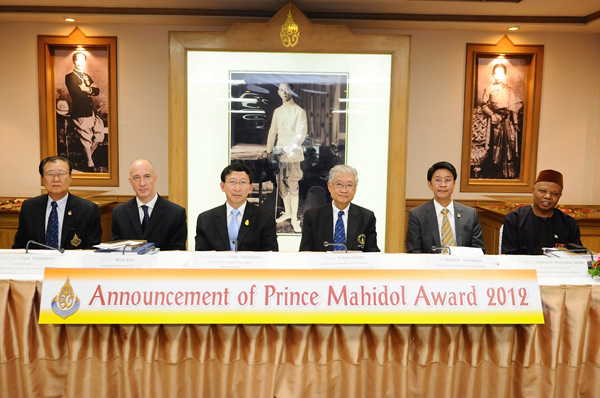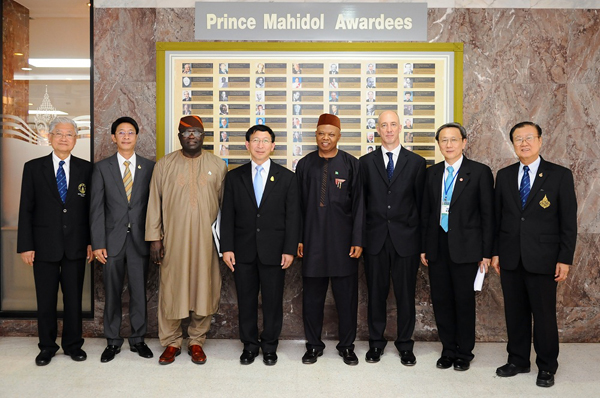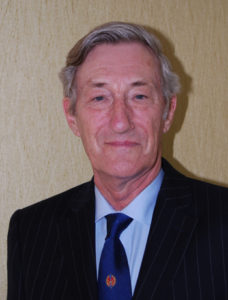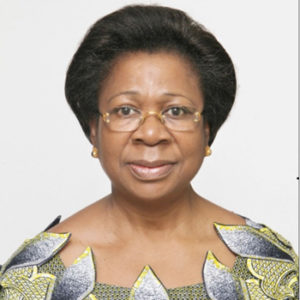
The Prince Mahidol Award Foundation of which H.R.H. Princess Maha Chakri Sirindhorn is the President, has decided to confer this yesr’s Prince Mahidol Award in the field of medicine to Sir Michael David Rawlins of United Kingdom. In the field of public health, the Prince Mahidol Award is conferred to Dr.Uche Veronica Amazigo of Federal Republic of Nigeria.
There are a total of 75 nominations from 34 countries. The Scientific Advisory Committee carefully screened all candidates from the year 2012, 2011, and 2010 and then submitted a short list of the candidates to the International Award Committee who scrutinized and made a recommendation to the Board of Trustees. H.R.H. Princess Maha Chakri Sirindhorn presided over the meeting of the Board of Trustees on 9th November 2012 in which the final decision on the Prince Mahidol Award 2012 was made.

In the past 20 years, 62 individuals, groups of individuals, and institutions have received the Prince Mahidol Award. Among them, two subsequently received the Nobel Prize in Physiology or Medicine, namely Professor Dr. Barry James Marshall and Professor Dr. Harald zur Hausen. Two Thai had received the Prince Mahidol Award in 1996, they were Professor Prasong Tuchinda and Professor Suchitra Nimmannitya and two more in 2009: Dr.Wiwat Rojanapithayakorn and Mr.Mechai Viravaidya.
The Prince Mahidol Award Foundation under the Royal Patronage was established in commemoration of the centenary of the birth of His Royal Highness Prince Mahidol of Songkla, on January 1, 1992. The Foundation is under the Royal Patronage, with Her Royal Highness Princess Maha Chakri Sirindhorn as president. The Foundation annually confers two Prince Mahidol Awards upon individual(s) or institution(s), which have demonstrated outstanding and exemplary contributions to the advancement of the world’s medical and public health services. Each Award consists of a medal, a certificate and a sum of US $100,000.
The Presentation Ceremony of the Prince Mahidol Award 2012 at the Chakri Throne hall will be held at the end of January 2013. Prior to the Ceremony, Siriraj Hospital, as a founder of the Prince Mahidol Award Foundation, will invite the 2012 Prince Mahidol Award Laureates to give lectures based on their achievement.

Founding Chairman, National Institute for Health and Clinical
Excellence (NICE)
Honorary Professor, London School of Hygiene and Tropical Medicine, University of London President, Royal Society of Medicine,
United Kingdom
Sir Michael David Rawlins is considered a pioneer in bringing approaches and practices of scientific and clinical-based evidences to evaluate the efficiency and worthiness of drugs, instruments and medical procedures. He determined guidelines for medical treatment, incorporating the highest benefit and cost efficiency. He established the National Institute for Health and Clinical Excellence (NICE) in 1999 to enforce the aforementioned approaches and practices. The institute is aimed to systematically evaluate both positive and negative effects that occurred in the past, present and future, including effects in health, economic, social and moral dimensions. The guidelines and practices of medicine lead decision-makers to a more equitable use of resources, as well as a more transparent and accountable budget allocation.
Sir Michael David Rawlins’ contribution provides patients with the highest attainable standard of healthcare and cost efficiency throughout the UK. Moreover, the key elements of the NICE have had a significant impact on healthcare policy and have been adopted by various countries, including Thailand, benefiting the healthcare of hundreds of million people across the globe.
Sir Michael David Rawlins obtained his medical degree from St. Thomas’s Hospital, University of London in the United Kingdom.

Former Director, African Programme for Onchocerciasis
Control (APOC), World Health Organization (WHO),
Federal Republic of Nigeria
Dr. Uche Veronica Amazigo is considered a leading figure in the introduction and application of community-directed treatment and control of important diseases. She developed a model that made it possible for community members to play a role in distributing medicine to the affected population. Dr. Amazigo is instrumental in the success of the control of Onchocerciasis (river blindness) in strengthening community health system in 500,000 communities across 19 countries covered by the African Programme on Onchocerciasis (APOC) of the World Health Organization, especially while she was Director of the Programme from 2005-2011. This approach changes the effectiveness of the treatment, is cost-effective and tremendously increases the coverage of patients being treated by drug, as it proved that community members can also take on the role normally played by more highly trained healthcare specialists. The concept of community-directed treatment has then been implemented in several countries across Africa and around the world. In 2015, an estimate of 90 million people will regularly receive the treatment for Onchocerciasis and 40,000 people will be prevented from risking the disease annually.
The success of this community-directed approach results from linking research and management strategies and by empowering communities to fully participate in distributing medicine to the affected population.
Although community-directed treatment was introduced as a strategy to increase coverage and access to drug in Onchocerciasis, it went on to have impacts on the control of other diseases and essential healthcare services in Africa. It was estimated that the community-directed treatment benefited over 11 million people in Africa, with malaria control and another 37 million people from other types of diseases.
Dr. Amazigo received Ph.D. in Biology and Medical Parasitology from the Univesity of Vienna in Austria, Diploma in Tropical Medicine and Parasitology from the Bernhard-Nocht Institute of Tropical Medicine in Hamburg, Germany and Fellowship in International Health from Harvard School of Public Health, U.S.A.

